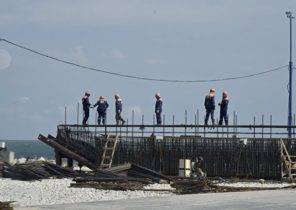“A clear message to Lukashenko and his nomenclature”
For more than two decades, almost every electoral campaign in Belarus, this topic again became topical in connection with large-scale repression of opponents of Alexander Lukashenko. 9 July in the European Parliament discussed the situation in Belarus before the presidential election. The discussion was preceded by a specially trained EU high representative for foreign Affairs and security policy Josep Borrell report. It was designated a number of claims to the Belarusian authorities: the persecution and arrests of civil society activists and opposition candidates, human rights violations.
Although some advances in European-Belarusian relations was noted, however, sounded a warning that further relations between Minsk and Brussels will depend on the Belarus presidential election. MEPs, as usual, took a tougher stance. Most of them criticized the situation, as one of levers of influence on the Belarusian regime called the imposition of sanctions.
So, the representative of Lithuania Andrius Kubilius offered to send “a clear message to Lukashenko and his item: if Jul 14, opposition candidates will not be registered if the political prisoners and the candidates will not be released if people on the streets will continue to harass and intimidate, then there will be sanctions, personal sanctions”.
On 14 July, the CEC did not register two of the most charismatic and popular of Lukashenko’s opponents in this campaign — Victor Babariko and Valery Tsepkalo. The EU responded with a new statement by Josep Borrell, but the term “sanctions” in this statement was not used.
Sanctions: pros and cons
A discussion about the use of sanctions approach in the Belarusian case is already nearly a quarter of a century. Over the years he has repeatedly applied, however, reasons to think he is effective and has not appeared — radical changes in the domestic policy of Belarus has not happened.
You can, of course, to believe that in the absence of such pressure situation in the country would be even worse. In addition, these actions testified to the moral support from the West. However, over time it became less of a comfort to democratic forces in the country. Immunity of Minsk to the sanctions helped, of course, huge economic and political support of Moscow. This allows the Belarusian leadership not to fear no serious negative consequences of Western discontent.
Radical members of the opposition constantly argued that the reason the lack of rigidity sanctions. Say, a complete cessation of trade relations with Belarus would lead to mass discontent of the population and, consequently, to the inevitable fall of the regime.
However, in those years Russia has enough possibilities to provide Minsk and additional help. Besides the national consciousness of the General population of Belarus was clearly inferior to his material interest. So even in the case of change of power to it likely would come who promised a speedy increase in quality of life. And since really to some extent it could provide only Moscow, the negative consequences for sovereignty would have been inevitable.
What a way to elect Brussels and Washington?
Now the situation in the country and around it has changed significantly. First of all, the obvious visible growth of national and political consciousness of citizens, which, in particular, by their activity in the process of passing the electoral campaign.
Further, due to various circumstances, Russia has greatly reduced the resources for helping “main ally”. And this desire weakened, as evidenced by the failure to offset the effects of tax changes, to revise the gas price for the current year and so on. At the same time, the Kremlin has sharply increased Imperial appetites. Obviously, the road map “integration” is ultimately aimed, if not formal, then the actual incorporation of our country. The Belarusian leadership, such a prospect is not enough, as it leads to loss of powers, and it will fight back. It is unclear just how long, because now the threat arises from inside. And long-term practice showed that in this case, the mode is ready for any measures, the anxiety due to possible dissatisfaction of the West recedes into the background.
Then before the last gets back the sanctions dilemma. Now, when the European Union and the United States has its own set of complex problems, Belarus is unlikely to be in the center of their attention.
Besides, in Washington and Brussels realize that, despite improved relations, if the Belarusian authorities need a clear choice, he would be in favor of Moscow. In these circumstances, the West is unlikely to want to take a harsh stance. Because measures are likely to be limited to something like introducing visa bans for certain persons. And perhaps this list will include tens of thousands of members of election commissions, what some are already calling opponents of the regime.
But given the fact that the growth of political activity of Belarusians took in a sharp reduction in Western support for civil society, the EU and the United States unable to return to the strategy of previous years and strengthen such support.







